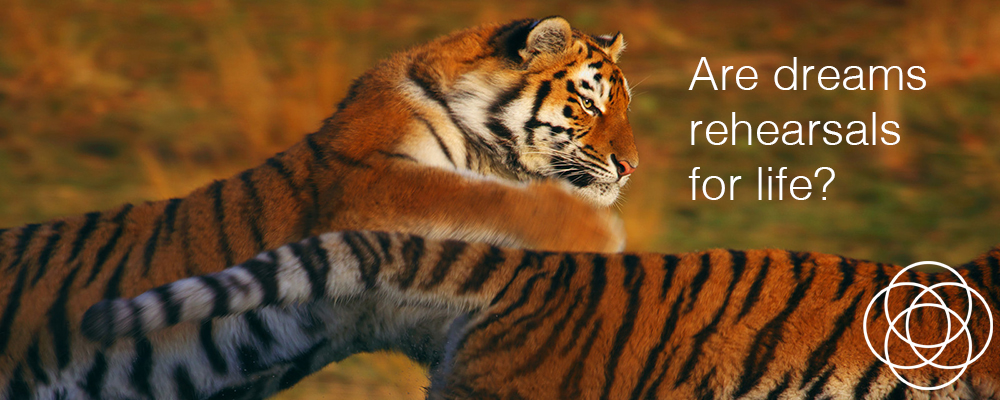
There’s a widespread theory that our dreams are mental dress rehearsals for life. Might this be true? Do we practice and learn life skills in the safe space of our dreams? Well, yes, and no.
The theory is usually put like this: Imagine our ancestors dreaming about being chased by wolves. Imagine them dreaming of running faster than the wolves, or outwitting them in some way, reaching safety, staying alive. The theory is that while our ancestors were safely tucked up for the night in fur skins, deep inside caves, their dreams of running from danger rehearsed the coordination of their brain, nerves, and muscles, enhancing their motor skills and fine-tuning their survival techniques.
Science has proven that athletes and musicians can enhance their physical performance by mentally rehearsing it during visualisation, suggesting that physical muscle-nerve coordination is fine tuned alongside mental attitude and memorising procedures during mental rehearsal.
If an athlete can run faster as a result of visualising running faster while awake, might dreaming of running have an even better result, given that we really believe in a dream while we’re in it? In a dream, if we’re running from a pack of wolves, we’re giving it all we’ve got, and surely that builds even better nerve-muscle coordination than visualisation?
Well, yes, it probably does if you’re running successfully in your dream.
But how do you respond in dreams where you’re chased by wolves?
Or, to change context slightly, how do you respond in dreams when the brakes fail on the car you’re driving, or when you’re about to give a presentation you haven’t prepared for? These are all common dream themes, and, if these were dress rehearsals for life, wouldn’t you expect to dream of finding a way to use the handbrake and discover new amazing driving skills to slow the car, or give an ace dream presentation off the top of your head or negotiate a solution that allows you time to prepare?
In such dreams you may more commonly find yourself waking up in panic as the brakeless car heads for the edge of a cliff, or helplessly watching the faces on your audience as your dream presentation bombs.
Not brilliant rehearsals for life really.
But these are brilliant dreams for helping us to identify our coping patterns, our strategies for dealing – or not dealing – with problems and challenges in life.
That no-brakes car dream might help you to see that you drive yourself too fast in one area of your life, perhaps as a strategy to keep yourself too busy to address an issue in another area of your life. Or it might help you to see that you’re feeling way more out of control than you admit. Or it might help you to recognise an unconscious fear of being out of control. Our dreams are unique and personal, and the other details in a dream help pinpoint the interpretation.
Once you understand your dream, and you identify your conscious and unconscious coping patterns and strategies, you can change them (using dream alchemy techniques) to achieve better outcomes in life.
On the other hand, our dreams can come up with wonderful solutions to problems as we rehearse our creativity.
Or we might discover, in a falling dream, that we can fly, or land softly, rehearsing surrender.
Or we might find, in that dream where we are unprepared for a presentation that we can wing it, rehearsing relying on our intuition.
Or we might notice, in a dream of running from wolves, that if we turn to face them we hear the message they were chasing us to deliver, rehearsing learning from our fears by facing them.
So are dreams rehearsals for life?
When we understand our dreams, we understand the scripts we follow in our lives. Some scripts are good, and rehearsing them will take us to better places. Some scripts are not so good, and rehearsing them in our dreams consolidates the not-so-good outcomes in our lives.
If your dreams are rehearsals for the movie of your life, analyse and explore your dreams to evaluate the scripts you are bringing to life.
NOTE: Sorry, the video clip below is no longer accessible (October 2019).

Click to watch me talking about this on Today Extra last week (video only accessible within Australia).

